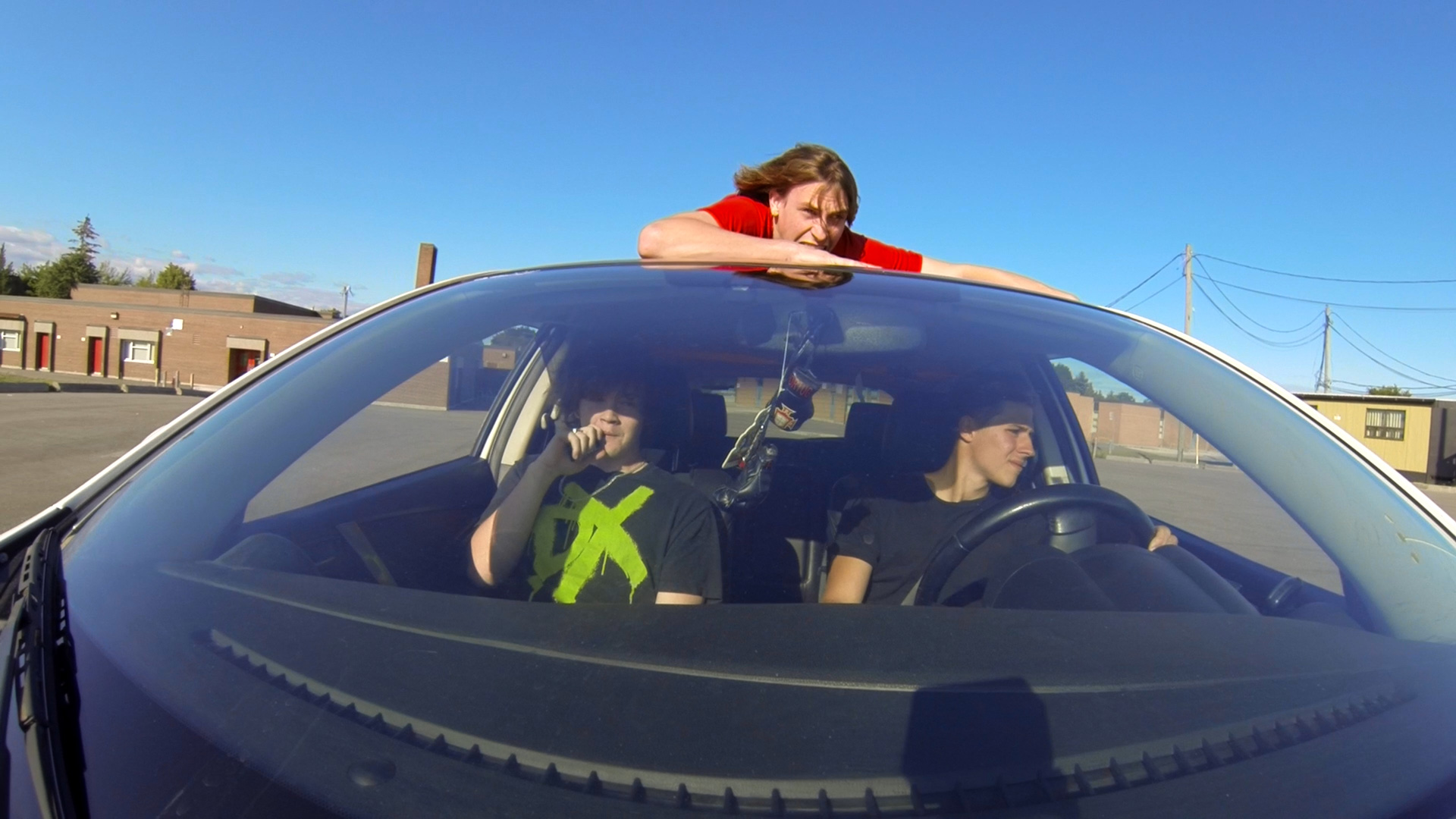My high school days ended before social media and school-shooting drills. We just had the odd bomb threat, apple exploding against an unsuspecting student’s skull, and mesh gym bags that solved zero problems whatsoever. So watching Ethan Eng’s Therapy Dogs and its meme-able events can be jarring. Especially uncomfortable moments, such as the non-joke “joke” of putting a fake gun to a classmate’s temple and capturing the reaction with the potential of showing millions. I can’t imagine the psychological ramifications of knowing at that age that everything you do, is done to you, can go viral instantly. How do you cope with that involuntary transparency? How do you process the uncertainty we all felt in our own eras with nothing to separate your private and public spheres of existence?
I think Eng and best friend Justin Morrice’s answer would be to lean into it full-throttle. That’s what they’re ultimately doing here under the auspices of shooting a senior video. With unfettered access amongst peers in public, private, and public-private arenas (because the school itself would never let this film be made if it knew this film was being made), they capture what it is like to be a teenager. Full stop. Not a Canadian teenager. Not a teenager growing up in Mississauga, Ontario. Just a teenager regardless of the circumstances––that obvious sense of melancholic isolation in the eyes of everyone onscreen is universal no matter where you’re from or your specific situation. No matter how high these kids get, that dread is inevitable.
It’s also where the film is at its most interesting; there’s no real cohesive narrative here. It’s just a curated series of stunts, candid moments, and provocations. We follow Kyle Peacock for a little bit. Dump a whole lot of baggage onto Jayden Frost without context. And experience a triptych of Kevin Tseng’s artistic hopes, successes, and doubts. This trio of subjects called out by name have their own respective charm, but their inclusion is no less chaotic than the whole for which they are simply three small pieces. Even time spent with Ethan and Justin doing their own approximation of Jackass does little besides entertain for a second before getting shuffled off to the next segment. It’s glimpses behind the artifice that linger.
And they’re enough. They’re the reality behind the façade of happy kids when happiness doesn’t necessarily force you to voluntarily perform a series of ever-escalating risks for the camera. Hearing one classmate at the start say that the only good thing about Cawthra Park High is that “It’s a school” and the only thing he wants to ever say to it is “goodbye” perfectly encapsulates what most, if not all, of these teens really feel. He’s the only one willing to speak it out-loud and not care about the consequences. The others get drunk and high. They break into abandoned homes and kick holes in drywall. They absorb themselves in the arts they wish would give them an escape even as they wonder if one exists.
That’s why Therapy Dogs is undeniably authentic, regardless of whether some sequences are staged: as each fiction unfolds we understand the emotions and futility that birthed them. Behind every insane story lies the fear of being untethered. You can’t go back to being a child and you don’t know how to move forward to become an adult, so you live on the edge of the here and now with an unsustainable sense of immortality to punch lockers, ride on the roof of cars doing donuts, or climb a rusty water tower with no safety net. Sprinkle in a post-performance smoke, the performative bliss of young love, and the inevitable frustrations of miscommunication and pent-up rage––the experience renders every seemingly disjointed moment invaluable.
It’s a kinetic, hopeful snapshot of today’s generation finding itself on its own terms. Which means reckoning with the isolation of having the world at your fingertips without the means to engage with it, the necessity to ignore the generations that came before when today’s world is nothing like the one they inherited despite their death grip to maintain control. I love that we don’t really see any adults. They’re always in the background (except when the police are threatening potential arrest) so Eng can showcase the reality that his generation’s actions aren’t dictated by their rules. None of ours were, either, but the past 20 years have rendered this latest disparity different. The stakes do seem so much higher.
Therapy Dogs opens in theaters on March 10 and arrives on VOD on March 17.

